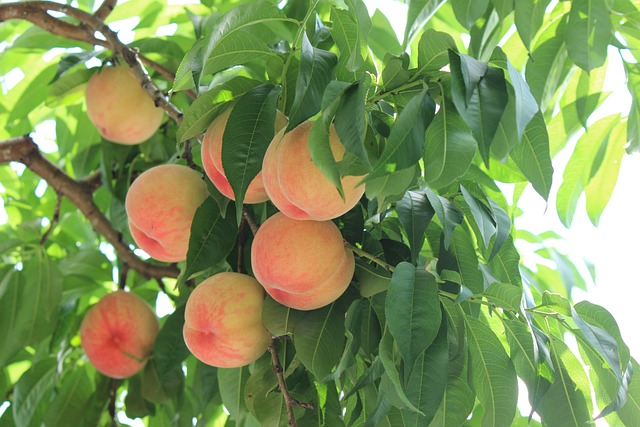Peach is a small (3-5m) summer green tree. The crown of the plant is wide, up to 6 m in diameter, which often contributes to the breaking of the tree, due to the weight of the fruit. The bark of the trunk is reddish brown, scaly. The leaves are elongated lanceolate, arranged alternately, slightly toothed, with a pointed tip. Flowers pink. Flowering begins in March-April and will last 12 days. The flowers appear at the same time as the leaves or even before them. Peaches of the early variety mature after flowering within 3 months, medium early varieties within 3-4 months, late varieties after 4-5 months.
The fruit is large, ball-shaped, velvety hairy drupe. The flesh of the fruit is juicy, sweet, aromatic, greenish-white with a blush. The bone is hard, large with a deeply folded surface. The fruits can reach a weight of up to 300 grams, but there are also varieties with smaller fruits. The tree begins to produce fruit in the 2-4th year of its life.
Flowers, leaves, fruits and seeds are used for medicinal purposes.
Peach blossoms are collected in March-April, when the tree blooms. Collect only in dry weather. Store the drug in a ventilated container for no longer than two years.
The seeds are located in the middle of the stone. To retrieve them, you have to break the dice. The obtained seeds are used fresh or dried. The seeds are dried in the shade or in ovens, not exceeding a temperature of 40C. Just do not forget that the seeds form dangerous compounds.
Peach fruits contain sugar (15%), fiber (0.9%), proteins (<0.9%), dyes, organic acids (tartaric acid, malic acid, citric acid, chlorogenic acid, quinic acid), trace elements (calcium, potassium, magnesium, silicon, sodium, sulfur, phosphorus, aluminum, chlorine, fluorine, etc.). The fruit also contains a lot of vitamins B1, B2, B6, B15, A, C and E. The essential oils of the fruit consist of linalool esters - acetic acid, formic acid, caprylic acid and valderic acid.
The seeds contain vegetable fat (<57%), consisting of oleic acid, stearic acid, palmitic acid, sitosterol; essential bitter oil (<0.7%), laetrile (B17). Glycoside amygdalin under hydrolysis forms hydrocyanic acid, benzaldehyde and glucose.
The flavonoids persicoside and naringenin have been found in the bark.
Medicinal significance
According to research results, polyphenol natural preparations from peach leaves increase the phagocytic activity of neutrophils and macrophages, which activates the production of antibodies, increases the number of T-lymphocytes, basically stimulates the immune system.
Peach preparations have antioxidant properties, they help cleanse the body of free radicals that contribute to aging.
Researchers have also determined the positive effects of peach leaves on cancer patients. Decoctions of leaves improved the condition of patients after chemotherapies.
The popular vitamin B17, or amygdalin, was rejected in studies as an effective anti-cancer agent, and its use is not promising, purely because it forms a highly poisonous compound.
The effectiveness of peach preparations in gynecology has also been determined experimentally. When using them within 3-5 months, the symptoms of mastopathy, adenomyosis disappear, and the menstrual cycle normalizes.
Peach preparations increase the hemoglobin content in the blood and are useful in anemia.
Positive effects have been obtained using peach seed oil in the treatment of prostatitis, tuberculosis, dysbacteriosis, conjunctivitis, periodontitis and stomatitis.
The components contained in peach fruits reduce stress, reduce the effects of toxins, thereby strengthening the immune system.
In folk medicine (Asia), leaf decoctions are used to treat rheumatic and headache pain, digestive tract diseases, gastritis and constipation. The leaves have laxative and diuretic properties. Decoctions of leaves and flowers and infusions are used in diabetes, kidney stones and as an antihelminthic remedy. Wounds and burns are treated with crushed leaves. Externally, the decoction is used in baths to treat eczema, scabies, neurodermatitis, abscesses and boils.
Peach oil is used to treat various skin diseases and inflammation of the oral cavity. The oil can also help with hemorrhoids and conjunctivitis.
Peach fruits will be very useful for people suffering from enterocolitis, gastritis and liver diseases. Thanks to the potassium content in the fruit pulp, they will also be useful for heart patients.
In ancient times, decoctions of tree bark and seeds were used to treat fever, chronic bronchitis, flu, asthma and colds.
